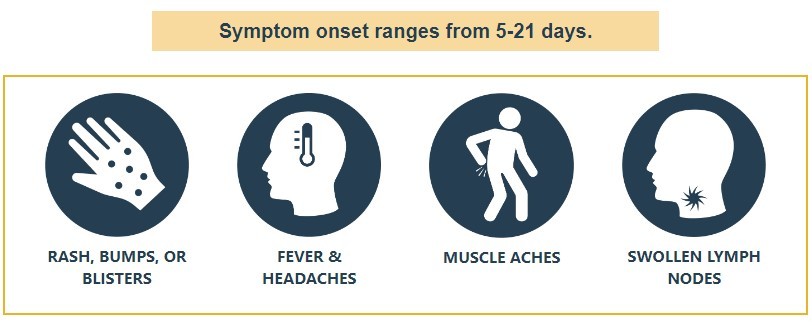Monkeypox, an infectious viral disease caused by the monkeypox virus, has historically been primarily observed in animals and in isolated clusters in the human population. Although it has been restricted to selected clusters since the first documented human case in 1970, recent trends have shown more recorded cases occurring more frequently and in greater scale than previously recorded. As of August 30, 2022, Los Angeles County Department of Public Health (DPH) has confirmed more than 1,500 cases since May of this year. For daily case number updates, please visit the DPH Monkeypox dashboard. At this moment, the risk of monkeypox in the general population remains very low based on the information available.
Monkeypox is typically transmitted from one person to another by close contact with lesions, body fluids, respiratory droplets and contaminated materials such as clothing or bedding. People with a monkeypox infection develop a rash located on or near the genitals, anus, hands, feet, chest, face and/or mouth areas.
Other symptoms include the following:
- swollen lymph nodes
- fever
- chills
- exhaustion
- muscle aches or backaches
- headaches
- respiratory symptoms (sore throat, nasal congestion, coughing, )
Monkeypox symptoms usually start within 3 weeks of initial exposure, with rashes and blisters developing 1-4 days before or after onset of flu symptoms. Most people with monkeypox will experience only mild symptoms and recover without medical intervention within 2 to 4 weeks after first symptoms.
In August, DPH has begun administering vaccine doses for the monkeypox virus. Due to limited supply, the monkeypox vaccine distributed DPH is available to gay or bisexual men and transgender persons who had multiple or anonymous sex partners in the past 14 days. Eligibility requirements and vaccine availability are subject to change. Further details on the vaccine and eligibility, as well as information on how to sign up for vaccination are available on the DPH website, or by phone at 1-833-540-0473.
DPH advises that those with monkeypox symptoms or currently under isolation for monkeypox are not to come to vaccination clinics or walk-up sites. If exposed to monkeypox or currently experiencing symptoms of monkeypox, DPH also advised that individuals speak with their provider and get tested; alternatively, if the individual does not have a provider, they can call 2-1-1 for assistance.
